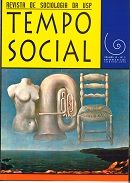Narrativa e história
DOI:
https://doi.org/10.1590/S0103-20702000000200002Keywords:
narrative, history, oblivion, memory, simbolization, writing of history, imaginationAbstract
The text deals with the question of the specificity of historical narrative focusing on events that are forgotten. This is a problem faced by the Social Sciences and by History, when dealing with the construction of events as absences, that is, constructions that have disappeared, produced by silences, the unsaid and repression. These constructions are scenes that organize history.The possibility of their symbolization -the writing of history- also involves the possibility of imagination, in the sense that these constructions, besides disappearing, are also unknown. This implies the discussion of the relationship between the symbolic and the imaginary and between history and fiction.Downloads
References
ADORNO, Theodor. (1986) O ensaio como forma. In: COHN, Gabriel (org.) Theodor W. Adorno. São Paulo, Ática, p. 167-187.
ARENDT, Hannah. (1972) Entre o passado e o futuro. São Paulo, Perspectiva.
ARENDT, Hannah. (1997) Origens do totalitarismo. São Paulo, Companhia das Letras.
ARRUDA, Maria Arminda do Nascimento. (2000) Metrópole e Cultura – São Paulo meio de século. Tese de Livre-Docência, São Paulo, FFLCHUSP.
BENJAMIN, Walter. (1980) Sobre alguns temas em Baudelaire. Os Pensadores. São Paulo, Abril.
BENJAMIN, Walter. (1985a) Sobre o conceito de história. Obras escolhidas I. São Paulo, Brasiliense.
BENJAMIN, Walter. (1985b) O narrador. Obras escolhidas I. São Paulo, Brasiliense.
CARDOSO, Irene. (1996) Maria Antônia: a interrogação sobre um lugar a partir da dor. Tempo Social, São Paulo, 8(2): 1-10, outubro.
CARDOSO, Irene. (1998) História, Memória e Crítica do Presente. Tese de Livre-Docência. São Paulo, FFLCH-USP.
CHARTIER, Roger. (1990) A história cultural. Lisboa, Difel.
DEBORD, Guy. (1997) A sociedade do espetáculo. Rio de Janeiro, Contraponto.
DE CERTAU, Michel. (1982) A escrita da história. Rio de Janeiro, Forense.
FURET, François. (s./d.) A oficina da história. Lisboa, Gradiva.
GAGNEBIN, Jeanne-Marie. (1992) História e cotidiano em Walter Benjamin. Revista USP. São Paulo, (15): 44-47, setembro-outubro-novembro.
GAGNEBIN, Jeanne-Marie. (1994) História e narração em Walter Benjamin. São Paulo, Perspectiva.
HOBSBAWN, Eric. (1995) Era dos extremos: o breve século XX: 1914–1991. São Paulo, Companhia das Letras.
HOBSBAWN, Eric. (1997) Entrevista. Folha de S. Paulo – Caderno Mais!, 22 /06, p. 8-9.
LEFORT, Claude. (1983) A invenção democrática. São Paulo, Brasiliense.
LE GOFF, Jacques. (1990) A história nova. São Paulo, Martins Fontes.
MURICY, Katia. (1995) O heroísmo do presente. Tempo Social, São Paulo, 7(1-2): 31-44, outubro.
NORA, Pierre. (1993) Entre memória e história. A problemática dos lugares. Projeto História. São Paulo, PUC, (10): 7-28, dezembro.
POLLAK, Michel. (1989) Memória, esquecimento, silêncio. Estudos Históricos. Rio de Janeiro, 2(3): 3-15.
POUILLON, Jean. (1974) O tempo no romance. São Paulo, Cultrix.
RICOEUR, Paul. (1991) O si mesmo como um outro. Campinas, Papirus.
RICOEUR, Paul. (1994) Tempo e narrativa I. Campinas, Papirus.
RICOEUR, Paul. (1995) Tempo e narrativa II. Campinas, Papirus.
RICOEUR, Paul. (1997) Tempo e narrativa III. Campinas, Papirus.
SARLO, Beatriz. (1997) Cenas da vida pós-moderna. Rio de Janeiro, Editora da UFRJ.
VEYNE, Paul. (1983) Como se escreve a história. Lisboa, Edições 70.
Downloads
Published
Issue
Section
License
Copyright (c) 2015 Tempo Social

This work is licensed under a Creative Commons Attribution-NonCommercial 4.0 International License.


